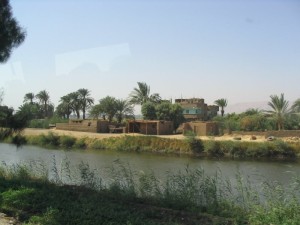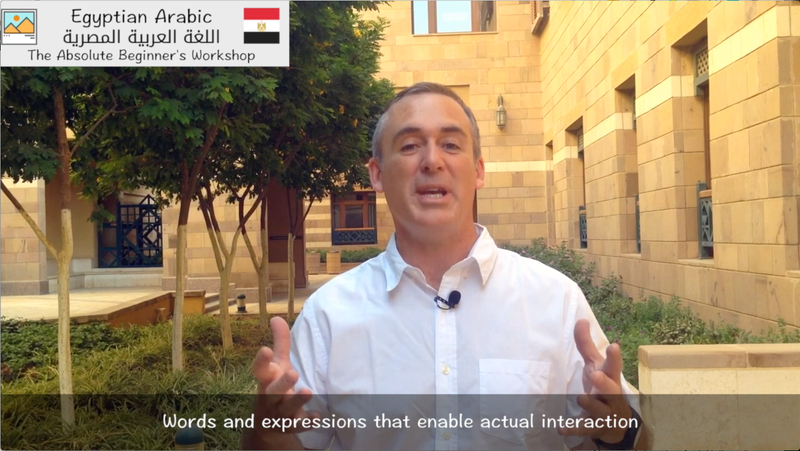Over the summer, I’ve been working on developing an introductory course for Egyptian Arabic called, “Egyptian Arabic: the Absolute Beginners Course”. This has taken a lot of my time and that’s why I haven’t been blogging very much. It’s been really fun talking to absolute beginners in Egyptian Arabic to find out what is important to them, and laying out a simple course that approaches Egyptian Arabic from the point of view of asking “how can I begin to interact quickly and effectively in spoken Arabic, in a matter of hours”.
If, by the way, you are interested in being notified when the course goes live, you can sign up here.
Developing the course materials got me thinking about things I’ve learned so far in my own Arabic journey. Here are four things I’ve learned that can help you fast-track your Egyptian Arabic language learning, or any type of Arabic language learning.
1. Use the Arabic that you have so far
Don’t be afraid of making mistakes! One of the most difficult things as a new learner of the language can be the fear of making mistakes. This fear is very counterproductive, because it prevents you from doing the one thing that will actually improve your language, and that is using it. Use it to the full extent that it exists!
Now it’s true that mistakes can mean getting into some potentially awkward situations, but that’s where you can laugh at yourself and what’s happened, and learn. It reminds me of a time in my first year in Egypt in the 1990s when I was visiting a farming village in southern Egypt. I was staying with a friend whose entire extended family lived in the village. One morning we visited his aunt at her house, only to find out that she had invited about 30 women and girls to the house at the same time. A bit awkward, but my friend assured me it was fine. At one point in the conversation, the aunt said to me, “We love having you here with us! I have a great idea… if you pay us 1000 Egyptian Pounds, you can marry my niece, and live with us forever.”

Wanting to extract myself from what was feeling like a very delicate situation, and not wanting to hurt the feelings of the young niece who was also sitting in the room looking a bit embarrassed, I pulled out my best Arabic I could come up with. Nodding my head toward the niece, I replied “In this case, 1000 pounds would never be enough”. I smiled inwardly, thinking how I had escaped the situation while managing to build the self-image of the young woman.
Although I did not speak enough Arabic to know what I had said wrong, I immediately knew that something was not right. Everyone looked uncomfortable, and the niece quickly got up and left the room looking upset. Afterward, I found out from my friend that what I had actually said was,”In this case, 1000 pounds is far too much”.
Oops.
However, despite the awkwardness of that situation, I have never made a mistake saying “not enough” instead of “too much” ever since. Our most effective lessons come when we make mistakes.
2. Start and end conversations with some Arabic, even a few words if it’s all you have
There’s a lot of value in bracketing English conversations you have with Egyptians with simple Arabic expressions. For example, greeting your work colleagues with a صباح الخير (SabaaH il-khiir) before telling them in English that the water machine is broken and needs to be fixed. Your use of Arabic communicates respect, eagerness to learn, and honor for the language and culture. It will put a smile on the face of the Egyptians you talk with. It doesn’t, then there’re probably just one of the very small fraction of grouchy people that exist in any country, and you can ignore them.
The tendency of many Arabic language learners is to want to attain a high level of Arabic before they begin to actually use it in speech. This is a mistake. By doing this, you actually limit yourself to only using English or whatever other language you’re speaking until that unspecified moment in time when you determine that your Arabic is “good enough”. You miss out on the opportunity to interact with the Arabic that you do have (even if it’s a tiny amount), and build better relationships using that. Rather than being annoyed by your imperfect use of Arabic, most Egyptians will be thrilled that you are attempting to speak it, and will celebrate your small steps with enthusiasm.
3. Don’t be afraid to mix languages to communicate
In linguistics, the practice of mixing languages is often called code switching. So I might be speaking in Arabic with friends, but throwing in English words when the Arabic doesn’t come to mind. Or speaking English but throwing in Arabic words. Purists out there – I know you don’t like this! However, it’s important to look at a language as it actually spoken, not as we think it should be spoken. The reality is that in many languages people code-switch. Arabic is no exception, and educated Egyptians may in fact code-switch more than most speakers of other languages (my personal observation, not based on any research!).
This becomes very helpful for the language learner who understands that interaction is a more effective goal than perfection of the language. Egyptian Arabic is a spoken language and speaking means communicating. Egyptians themselves code-switch very often, even the ones that have a relatively small command of other languages. Using an approach that is commonly used by first-language speakers of Arabic, you can increase your ability to hold real conversations. This increases your interaction, and in the long run works to improve your grasp and use of communicative Arabic.
4. Don’t be afraid of ambiguity
You don’t have to understand everything. Carry on conversations with what you have, and backtrack when necessary. If you wait until you can understand every word in a conversation, you will never end up using your Arabic. Just begin to interact. The part you don’t understand, fake. If you guess wrong, you can fix things later. Of course, do not use this strategy in places where a breakdown of understanding can cause major problems such as a bank. But in most casual or friendly situations, use your even when you don’t understand everything is being said around.
Want to be informed when the Egyptian Arabic Absolute Beginner’s Course is launched? Click here.


 RSS - Posts
RSS - Posts
Comments are closed.